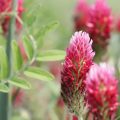- The Miraculous Shiny Bush Plant - January 18, 2021
- Colorful, Edible and Medicinal Celosia - January 10, 2021
- Radish, a Nutritional Power House - December 19, 2020
Any visitor to New Orleans usually gets an obligatory cup of the city’s chicory coffee. Chicory also known as blue sailor’s succor or sugarloaf is a perennial herb featuring bright blue flowers. It is native to India, Europe, and Egypt but has been domesticated in North America and other regions of the world. You are likely to stumble upon the plant growing along roadsides and other uncultivated areas especially in places with limestone soils.
[Note: The Right Flowers is not a medical site. Knowledge of and information about the therapeutic benefits and applications of flowers, while known through the ages, does not constitute medical advice. If you are having health issues, you should consult with a physician.]
Chicory looks like a dandelion in many aspects including featuring a rosette of toothed basal leaves and a deep taproot. However, unlike dandelion, it has a hairy flower stalk with small clasping leaves.
According to a renaissance theory known as the doctrine of signatures that outlines a plant’s appearance and its healing properties, chicory’s milky sap is said to regulate milk flow in nursing mothers. The blue flowers and their tendency to open in the morning and close at noon indicate that the plant is ideal for treating eye infections. In addition, its leaves can be made into a poultice and used to calm swellings.
During the 2nd century, Galen, a popular physician of the time, fondly referred to chicory as “friend of the liver”. In contemporary studies, research shows that chicory has the potential of increasing the flow of bile, which is helpful in treating gallstones. Lab tests also indicate that chicory extracts have anti-inflammatory, antibacterial and mild sedative properties.
Prevents cancer
Chicory has been indicated for helping to reduce tumor growth in various cancer studies. Emerging evidence shows that the plant contains fructans which have antioxidant and anti-tumor properties. According to a report by Dr. Marcel Roberfroid of Université Catholique de Louvain in Belgium, chicory is rich in polyphenols, and phytochemicals which have a positive effect on preventing various types of cancers including colorectal and breast cancer.
Helps in digestion
Chicory is great for your digestive system as it contains inulin, a powerful prebiotic. These are good bacteria with health benefits to the host, unlike disease-causing bacteria. According to Dr. Tom Van de Wiele of Ghent University, Belgium, inulin helps in combating various digestive and intestinal problems including indigestion, reflux disease, and heartburn.
Boosts heart health
Inulin is not only good for the digestive system but also ideal for lowering bad cholesterol in the body. Bad cholesterol is one of the underlying causes of high blood pressure and atherosclerosis because it blocks blood flow when it accumulates in veins and arteries. It is also known to play a role in causing strokes and heart attacks.
Though this plant can always be found growing in the wild, with so many chicory health benefits, the plant truly deserves a place in your garden.





